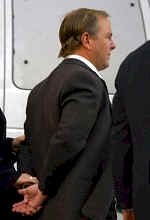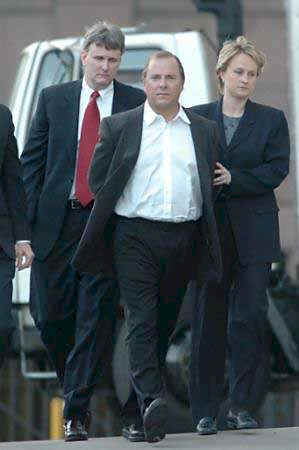![]()
by Judith Haney USNewsLink/March 1, 2002 OBJECTIVE: To win admiration for my smarts and absolution from accountability regarding my role in Enron's bankruptcy by outsmarting and making fools of each and every investigator and Congressional committee member I encounter. GAME PLAN: To maintain a true advantage by maintaining continuity; develop a power packed quick-hitting offense; be adaptable from investigator to investigator, and from Congressional committee to Congressional committee; always bear in mind that to win doesn't mean I have to carry the ball every time; keep in mind that a good offense means to keep the pressure on the defense; always remember that the one who executes the best, beats the best. Practice fundamentals of the game, don't veer from original course. Don't look shifty or vulnerable. EXPLOITATION OF THE MEDIA: Above all, use the media to my advantage. Take every opportunity presented to me to tell my story my way in order to maintain the direction of the spin. Remember to stay relaxed, sprinkle a few curse words in for flavor, give them my best boyish grin, use simple analogy for a simple audience, don't overstate my case, be approachable, and above all, act indignant when answering direct questions.
ADDITIONAL READING: Enron's Bust: Was it the result of Over-Confidence or a Confidence Game? PBS FRONTLINE'S Interview with Jeff Skilling Transcript
of February 26, 2002, Senate Commerce Committee Hearing on Enron
|
BACKGROUND
OF JEFFREY SKILLING BEFORE AND DURING ENRON "To truly understand Enron's Jeffrey Skilling — the hypersmart, hyperconfident chief executive of what may now be the largest energy trading company on the planet — head to your local video store and check out that classic of American cinema, Wayne's World. At 15, Skilling helped launch a no-budget television station in Aurora, Illinois — the very thing that Mike Myers and Dana Carvey so famously spoofed on Saturday Night Live and in two movies. The TV skit even begins with a sketch of a teenage cameraman, the role of the real-life Skilling. Now, sitting atop a gleaming 50-story tower in downtown Houston that sees 35 percent of North America's natural gas supply and 20 percent of the electricity pass through its trading floors, Skilling hasn't lost his bug for pirate TV. Every morning, Enron broadcasts company news onto high-definition monitors in the elevators. The 47-year-old CEO recently asked employees on a company Web site to vote on an important issue: Should he shave his beard? Such a Wayne-worthy stunt is emblematic of how decisions at Enron are made. Like Wayne, who polled his viewers about rock bands and other matters of the day, Skilling routinely solicits input from staffers high and low. In the case of his face, three quarters of voters told him to keep the beard. And like Wayne, in the end, Skilling runs the show. He shaved it anyway. This combination of open discourse and firm decision making — "loose-tight," as chief financial officer Andy Fastow terms it — has proved to be a potent tonic as Enron has grown to become, in terms of sales, one of the 15 largest companies in the world. Last year, it took in $101 billion, a 400 percent jump from three years earlier. Net income topped $1.3 billion, up 32 percent from 1999. The stock has soared from $19 in 1998 to a recent $62, despite finger-pointing stemming from the California electricity mess. Skilling, who has served as company president since 1993, was promoted to CEO in February and starts out as No. 2 on our third annual list of the top chief executives. "I'm not sure he has a nonstrategic bone in his body," says Kenneth Lay, Skilling's predecessor. Lay, a financial supporter of President Bush and the consummate Mr. Outside, remains with the company as chairman and will handle most external relations, leaving Skilling to reign as Mr. Inside. Strategy, architecture, implementation — these issues have obsessed Skilling since the fledgling days of Enron, the product of a 1985 merger between two gas pipeline companies. A hotshot young partner at the consulting firm McKinsey, Skilling spent most of the late 1980s quietly helping position Enron post-deregulation. While developing a financial instrument for gas contracts, Skilling hit upon the idea that would draw him to the company full-time: a fluid market where prices could be locked in months in advance. He launched Enron's gas-trading operation in 1990, and an electricity market soon followed. Skilling's value proposition went further: Enron would take actual physical delivery of the products traded so that clients could count on receiving shipments — no small assurance in the energy business, where delays mean no electricity or no heat. In the past year, Skilling has inserted Enron into the paper, pulp, lumber, metals, and media advertising markets. Indeed, energy is no longer the company's exclusive focus; it now considers any market within its purview. For years, the company vision statement read "Become the world's leading energy company." Skilling changed it to read "Become the world's leading company." And he's not talking figuratively. Skilling is nothing if not a quantitative guy: He means sales and market capitalization, and he knows exactly who's ahead of him, as well as how far. Skilling's passion for markets filters down to a laissez-faire management style. That's how EnronOnline got started. Although Skilling at first rejected the notion of an online market offering full hedging and delivery capabilities, a 31-year-old executive named Louise Kitchen pursued the concept on her own time, and other executives began joining her crusade. It rose in Enron's internal marketplace of ideas, and Skilling eventually went along. In the first full year since the site's launch, 700,000 trades, totaling more than $300 billion, were tallied — in terms of sales, it's probably the biggest Internet site in the world. Many of these contracts, in fact, undercut the company's traditional phone trading, but that doesn't bother Skilling in the least. Like any good free-market absolutist, he's comfortable with the theories of Joseph Schumpeter. "If you can cannibalize your own sales, you'd better do it," Skilling says. "Because otherwise someone's going to do it to you. This organization believes in creative destruction." The man who enables his customers to limit their risks thinks nothing of racing a motorcycle 1,000 miles across Mexico. He organized a scavenger hunt in the Australian outback in 1996. Looking to gain an edge, he gunned his Land Cruiser at nearly 100 miles an hour for a half hour before realizing that no one was anywhere near him. He stopped. It took an hour for the guide to catch up and inform Skilling that he had indeed left the group in the dust — but that he had gone the wrong way. It's the kind of moment his alter ego Wayne would appreciate. Whether or not Skilling can make Enron the world's largest company, it won't be for lack of trying." — Randall Lane |
Understanding Enron
(interactive graphic)• Enron Timeline
• Graphic: Lay, Skilling, Fastow Stock Sales
• Graphic: Other Executive Stock Sales
• Key Documents
• Historical Chart
• Special Report: Accounting Industry
• Special Report: Enron Probe
Executive Profiles
• Skilling: Urged Firm Transformation
• Fastow: A 'Low-Profile Guy,' A Wiz
• Kopper: Major Player No One Knew
Enron Corp.'s Collapse- Selected background stories
Plundering America
Enron's Bust: Was it the result of Over-Confidence or a Confidence Game?
Ex-Enron
CEO Said Taken to N.Y. Hospital
April 9, 2004
NEW YORK -- Former Enron CEO Jeffrey Skilling was taken to a hospital early Friday after several people called police saying he was pulling on their clothes and accusing them of being FBI agents, a police source familiar with the incident told The Associated Press.
Police took Skilling to the hospital after finding him at 4 a.m. at the corner of Park Avenue and East 73rd Street and determining he might be an "emotionally disturbed person," said the source, speaking to the AP on condition of anonymity.
Skilling's attorney said Friday that his client and his wife called police after they were assaulted by two men who had followed them. Police denied that account.
Police did not charge Skilling with a crime. They took him to New York Presbyterian Hospital for observation. Hospital officials would only say that Skilling had been discharged on Friday.
Skilling's attorney, Bruce Hiler, said Friday that Skilling was never at the two Manhattan bars police said he visited, American Trash and Vudu Lounge.
The police source said Skilling ran up to patrons at both the bars and pulled open their clothes.
"He was shouting at them, 'You're an FBI agent and you're following me,'" the source said.
The source added that Skilling allegedly did the same thing to people on the street. He was with his wife at the time, and was described as being intoxicated and highly uncooperative when he was approached by police, the source said.
Skilling has pleaded innocent to charges of fraud, insider trading and other crimes in the energy trader's collapse, and is free on $5 million bond. He is accused of participating in widespread schemes to mislead government regulators and investors about the company's earnings.


 On February 18. 2004, smooth talking Jeff Skilling, the ex-CEO
credited with cultivating the culture that led to Enron's burgeoning success and its
stunning crash, surrendered to the FBI in Houston to face 57 pages of charges that
include:
On February 18. 2004, smooth talking Jeff Skilling, the ex-CEO
credited with cultivating the culture that led to Enron's burgeoning success and its
stunning crash, surrendered to the FBI in Houston to face 57 pages of charges that
include:
